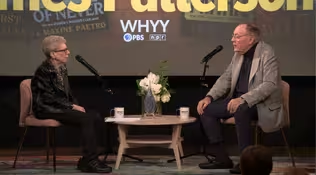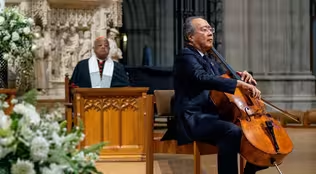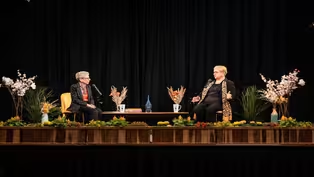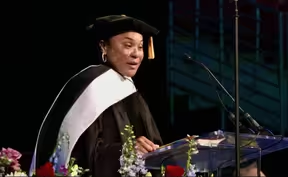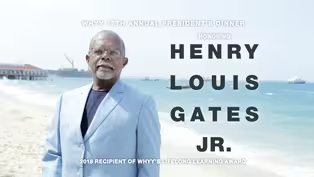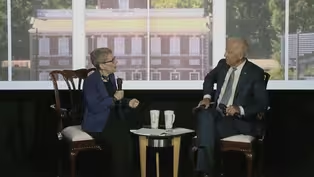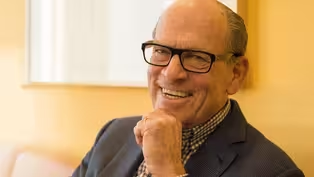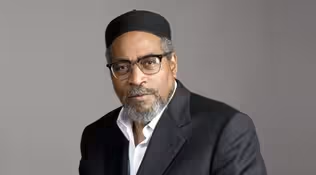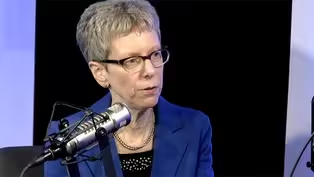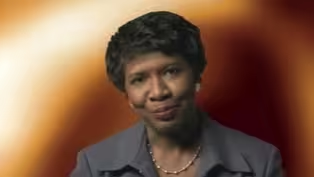
Terry Gross in Conversation with Dawn Staley
Special | 28m 45sVideo has Closed Captions
WHYY 20th Lifelong Learning Award recipient Dawn Staley interviewed by Terry Gross
WHYY 20th Lifelong Learning Award recipient Dawn Staley interviewed by Terry Gross, host of Fresh Air.
Problems playing video? | Closed Captioning Feedback
Problems playing video? | Closed Captioning Feedback
WHYY Presents is a local public television program presented by WHYY

Terry Gross in Conversation with Dawn Staley
Special | 28m 45sVideo has Closed Captions
WHYY 20th Lifelong Learning Award recipient Dawn Staley interviewed by Terry Gross, host of Fresh Air.
Problems playing video? | Closed Captioning Feedback
How to Watch WHYY Presents
WHYY Presents is available to stream on pbs.org and the free PBS App, available on iPhone, Apple TV, Android TV, Android smartphones, Amazon Fire TV, Amazon Fire Tablet, Roku, Samsung Smart TV, and Vizio.
More from This Collection
The WHYY Lifelong Learning Award recognizes an honoree who has demonstrated a passion for lifelong learning for themselves and for all those they can inspire. Previous recipients include President Joseph R. Biden, Dr. Anthony Fauci, Dr. Henry Louis Gates Jr., Gwen Ifill, Coach Dawn Staley, Lidia Bastianich and more.
James Patterson in Conversation with Terry Gross
Video has Closed Captions
Renowned author James Patterson accepts WHYY's 23rd Lifelong Learning Award. (27m 19s)
Yo-Yo Ma in Conversation with Terry Gross
Video has Closed Captions
Renowned cellist Yo-Yo Ma accepts WHYY's 22nd Lifelong Learning Award. (58m 45s)
Lidia Bastianich: WHYY Lifelong Learning Award 2023
Video has Closed Captions
Chef, television host, and restaurateur, Lidia Bastianich accepts WHYY's 21st LLA. (28m 45s)
Terry Gross in Conversation with Dawn Staley: Full Version
Honoring Olympic gold medalist, NCAA-winning coach & Basketball Hall of Famer Dawn Staley (1h 27m 4s)
WHYY’s Lifelong Learning Award honoring Dr. Anthony S. Fauci
Special virtual event honoring Dr. Fauci. (1h 6m 50s)
WHYY’s Lifelong Learning Award: Dr. Anthony S. Fauci VIP Q&A
Special virtual event honoring Dr. Fauci. (1h 35m 4s)
WHYY’s 17th Annual President’s Dinner
Video has Closed Captions
WHYY’s 17th Annual President’s Dinner featuring Dr. Henry Louis Gates Jr. (28m 47s)
Video has Closed Captions
The 2017 WHYY President's Dinner honoring Joseph R. Biden, Jr. (56m 46s)
WHYY's 15th Annual President's Dinner
Video has Closed Captions
WHYYs 15th Annual Presidents Dinner Honoring Joseph Neubauer (28m 47s)
WHYY's 2014 President's Dinner, Honoring Kenneth Gamble
Video has Closed Captions
Proceeds from this distinctive event support WHYY's extensive educational initiatives (27m 20s)
WHYY's 2013 President's Dinner, Honoring Terry Gross
Video has Closed Captions
WHYY turns the tables this year and honors Fresh Air host Terry Gross. (23m 13s)
WHYY's 2008 President's Dinner: Gwen Ifill
WHYY's 7th Annual Presidents Dinner Honoring Gwen Ifill (26m 42s)
Providing Support for PBS.org
Learn Moreabout PBS online sponsorship(upbeat music) - Good evening, I'm Cherri Gregg, and thank you for joining us for WHYY's Lifelong Learning Award presentation.
Tonight, we will be honoring one of Philadelphia's own basketball great Dawn Staley, a woman who has made us all proud, both on and off the court.
Our main event this evening will be an interview with Dawn Staley and Fresh Air's Terry Gross, which will begin shortly.
But first, Dawn Staley is a champion and inspiration to many.
She has been an example of excellence in everything, she touched, take a look.
(upbeat music) - Whether it's basketball, whether it's life, her community, she wants it right and she's gonna demand that.
And that comes from that competitive spirit that she has.
If we're out here, we're not out here to roller skate, we're out here to play and to win.
- She's basically Allen Iverson before Allen was Allen Iverson because she was just so scrappy.
- She took her knocks when she was a kid, because she played with the boys.
- She just got that Philly toughness, little jokes about nothing, she played hard.
- Mustang pride, she's a Mustang through and through.
(upbeat music) - [Neighbor] Like, most of us, her beginnings are humble.
- [Man] She's from a same neighborhood I am, a few blocks away and I always knew she was gonna be successful.
- I'm proud that she's not denying where she came from and acknowledging every part of her steps.
- In all the things she's achieved, being a female period and a black female, - She has represented Dobbins to the fullest and represented our community to the fullest, and I love that.
- As a high school player, she was an All-American, a collegiate player and All-American, a gold medal Olympian.
- I mean, it's like God touched her along the way from birth.
- I coached with her for two years, here at Temple before she moved.
I think everybody, first of all, had this unbelievable respect for her.
And then she had this special relationship with John Chaney, I would talk to him often about Dawn and the kind of impact she had made in college basketball, in the city of Philadelphia.
- She's taking whatever she's had and used it to benefit, not only herself, but girls basketball, women coaches, everything that she's been doing.
- Nobody really knew much about South Carolina's basketball program until Dawn got down there, and she's obviously taken that to another level.
- It's an inspiration to me like, dang, maybe I could do that too.
(upbeat music) (upbeat music) - [Man] She enjoys coming home and seeing everybody.
- She walks into a room and you notice, and she's five foot five.
She's not real tall or walking in here with a bunch of sizzle, she's walking in here with this great substance, that really means something to so many.
- There's no pretense.
There's no attempt to be somebody different than whom she is and that I think is classic Philly.
- Philadelphia is so proud of Dawn Staley for what she has accomplished.
- Dawn Staley please come forward and receive the honorary degree.
(audience applause) - This is a tremendous honor, but I have to tell you, their first option was the best scholar, but the best scholar was busy.
The second option was the best athlete, and of course the best athlete was busy.
Their third option was the best looking, and I said, what the heck?
I can't turn them down three times in a row.
(audience laughs) (audience cheers) That joke works every time.
- She has it, whatever it, is, she's got it.
(upbeat music) - I am so happy to say that our guest Dawn Staley, coach Staley is with us, Coach Staley, welcome.
Thank you for honoring us with your presence this evening.
- Thank you, thank you for having me.
I look forward to it.
- It is an honor.
I want to talk about you, first of all, I want to say congratulations on your second championship win with the Gamecocks.
I want to talk about you, but I first want to say something about Brittney Griner, which is to say, I want you to say something about Brittney Griner.
She's still detained in Russia.
Her detainment has been extended again.
I assume that you know her, I know you've been really advocating in everywhere that you can, for more attention to her detainment and everything that can be done for her release.
Tell us a little bit, we know she's a fantastic player, tell us a little bit about who she is as a person.
- Brittney Griner, I mean, she's wrongly deter detained.
Our US State Department has determined that, but who Brittney Griner is?
I mean, she's a fun loving person.
She's a giver.
I know one of the foundations that she birthed is giving shoes to young people because she was walking down the street in Phoenix and saw someone that was barefoot.
So she got out of the car opened up the trunk of her car and started giving out sneakers to this person.
And from that, she's been a giver.
I've known her for a little under 10 years now.
So I've watched her grow, I've watched her mature.
I've watched her become this incredible person.
I know everybody knows Brittney Griner for her ability to dominate on the basketball court, but she is as dominating in her community in giving back more so than any other player in the WNBA that I've been associated with.
- Well, thank you for the work you're doing, trying to get her released.
Let's talk about you.
You've reached the heights as a player and as a coach, but when you were first asked to be a coach at Temple University, as we heard you turned them down, why were you so reluctant to coach given that you've got such a gift for it as you later learned?
- Well, I think sometimes when you are and have been, and that was me at that time, I was singularly focused on my career as a player.
I was 29-years-old, I was still playing professional basketball.
And, and then I get this opportunity, of coaching and I was probably more afraid of being responsible for young people, that's closer to my age than anything.
So the responsibility part of it really just frightened me just a little bit.
And then, and then I was actually challenged into taking the job at Temple and quite naturally I'm drawn to challenges.
And once I was faced with that challenge, it was a full gone conclusion of taking a job and just creating experiences for young people at a delicate age of their lives and the most transformational years of their lives and make it good through life lessons of winning, winning at basketball.
- When did you first become obsessed with basketball?
- Here's the thing, I played all types of sports, when I was growing up in the projects.
I played football, like tackle football.
I played baseball, I played softball.
I ran track.
I did it all.
So I was, I was more in love with competition.
And then when I first received my first college letter of interest was in the eighth grade.
And that's when I chose basketball, 'cause I knew it would be that sport.
That could be the vehicle to incredible opportunities to check off some more dreams 'cause of growing up in the projects, I only seen, I've only seen women play, I'd only seen women play during the Olympic games and during the National Championship in the NCAA Tournament.
So I wanted to be a national champion and I wanted to be a gold medalist.
- Done and done.
- Yeah, a few times, a few times.
So yeah, again, my cup run it over.
- So you grew up in the Raymond Rosen Housing Projects in North Philly.
Tell us a little bit what the projects were like then and you grew up in the '70s and '80s.
- For me, the projects was a way of life.
I didn't see, I didn't see myself as poor.
My family didn't see ourselves as poor.
I mean we saw ourselves as working class people who worked hard, like I grew up in the projects, but I mean, it was incredibly clean.
- These were garden apartments, not a high rise.
- No yet, here's the thing, all of my siblings that are older than me, they had an experience in the high rises.
I've never had an experience of living in the high rises.
So I think myself, as a little more bougie because the row homes are a little more plush than going through the high rises.
So I, we had lawns, we had neighbors, my mom planted flowers and they bloomed and everything looked great.
My mom, although my mom had to clean houses for other people in order to make ends meet, but it was a job.
And my mom did it to the best of our ability.
She cleaned people's houses like a boss, like a CEO of a Fortune 500 company.
So, I come from a strong woman who just believed in doing things the right way, no matter what it was.
So, I thank God for my mother because she was a discipline.
She's a disciplinarian like I feared my mother.
I did not want to disappoint her.
- So there's a kind of famous story about you that when you were a kid and you wanted to play with the boys, you'd bring your own basketball and tell them that if they wanted to use the basketball, they had to let you play.
So that was your in, but then what, did they make it especially hard for you?
How do they feel about playing with a girl?
Because I know for a lot of boys that would be considered like lowering themselves in some way.
- Yeah, I mean, obviously they're not welcoming at all.
They weren't welcoming and they shouldn't been, I mean, I think you should be skeptical if one girl is showing up to play, you don't know what her motives are.
So I wanted, or they treated me just like a newcomer, like, just because I was a girl, I wasn't treated any differently.
I was treated like a newcomer.
If it was a new guy that showed up to the court, they're not gonna be welcoming to that person unless they prove themselves now because I'm a girl they're not gonna give me an opportunity to prove myself unless I bring my own ball to the court and hope that everybody else forgets to bring theirs.
- Yeah, 'cause I imagine they would initially think that they could take advantage of you that you'd be weak weaker than the boys.
And again, especially being short, for the game, they probably thought that too.
- You know what, the thing, I mean, when I was growing up, I was actually the same height as the guys that I was playing against.
It was just, they kept growing as they got older and I didn't.
So, it wasn't that I was, that much smaller than them, it's just, I didn't grow.
I didn't grow.
I'm a product of short parents.
- It was in middle school that you were first scouted by a college.
And then you went to college.
Well, you did great in high school.
I think USA Today named you Player of the Year.
And so again, in high school, were you on a boys team or a girls team or a mixed team?
- Finally in high school, we had a girls team.
- What was that like for you suddenly playing with girls after being the girl in the boys games?
- Yeah, playing with girls was a lot easier because of my ability to play with guys, I was faster, stronger.
I passed the ball a lot harder than girls, my age, because I had to with the guys, I mean, they were just quicker.
They were a little taller.
They covered the court a lot better.
So I was the one that had to make an adjustment because I was the one that was a lot different than most of the girls on my team, because this was not their first time playing with girls.
- I read that at UVA, it was the first time you were really in an atmosphere, an environment where there are a lot of white people, you weren't used to that.
Can you talk a little bit about the transition going from, living in the housing projects in North Philly to being at UVA?
- Yeah, the housing projects that I grew up in, I mean, it was probably 99.9% black.
And then I go to UVA and it's the first time that, I'm outnumbered as far as, black versus white or any other race.
And although, I was a very shy young person.
I didn't talk a whole lot.
I, just, I wasn't open to making new friends.
I'm from Philly, I'm from North Philly.
We just kind of stay in our lanes and we don't go outside of our comfort zone unless someone comes into our comfort zone.
And for me, going to Virginia was a huge step outside of my comfort zone.
And it took me a while to make the adjustment to be in an environment, I didn't do well in school in the beginning because I just, I didn't know how to study.
I wasn't comfortable.
And then, when I was threatened with getting kicked out of school, that's when my competitiveness kicked in.
I never reverted to my competitiveness until my back until I was challenged in that way.
And then I tapped into being a competitor.
So I looked at academics a lot differently once I had to.
And, after that moment at UVA, I was, I became a much better student.
And then I got used to just the system of being in that environment.
You gotta adjust, you gotta be able to pivot.
You gotta be able if it's something that you really want to do if I didn't really want to be at Virginia, win a national championship, being in that space, I would've given up, but I wanted to be in that space.
And that's the thing that really drove me to doing better.
- How did you go from being inexpressive, not making eye contact, being kind of introverted, just expressing yourself through the game, to being a coach where you really have to communicate with people.
I mean, you're probably part psychologist and therapist, as well as basketball coach.
And you're probably shouting on the sidelines during the game.
I mean, you have to be more extroverted and communicative as a coach.
- I'm a self prescribed dream merchant.
Like that's what I call myself a dream merchant.
And in order for you to be a dream merchant for the people that I serve, like I have to be the example, and I have years and years, and years and years of my own shortcomings, my own shortcomings to be shy, to be closed, to have all these things and to have overcome them.
I just try to set the example of transforming, my life into something that is an example for young people.
I mean, was it easy?
No, it really wasn't easy.
And I find that just through my life being uncomfortable, I found a way to grow.
And I give that to our players.
I am a, I'll give you an example, most of the players that I coach their parents, they don't want them to hurt.
They don't want them to be unhappy.
They don't want them to go through life hurting or failing as should I say, failing, bad game, bad grade.
Just break up with your boyfriend, their parents don't want them to go through that.
And I am the direct opposite of their parents.
I want them to do that.
I want you to have a breakup.
I want you to have a bad game.
I want you to fail a test because from those moments, growth is taking place.
You find a way to not have those repeat performances in those stages of your life.
So sometimes my players, they struggle with me because I don't treat them like their parents treat them.
- That's interesting.
Who do you want them to win?
You do want them to win.
- Yeah, I want them to win.
Winning this game of life, isn't it's a marathon.
It's not a sprint.
You're not gonna win a marathon in the first mile of it, but slowly you find a way to adjust and you pivot and you figure things out along the way.
It's a long, long, long, long journey.
And throughout your journey, you're going to fail.
You're going to have some shortcomings.
It is the very thing that you do to figure life out, to make things better.
And then you share those instances with other people and hope that they can learn from your mistakes and your shortcomings, so they won't fall prey to that.
They'll fall prey to something else.
- So our time is nearly up, but I just want you to play back a moment for us.
One of the greatest honors for an athlete is to play at the Olympics and at the Olympics, one of the greatest honors is to be the flag bearer, when all the athletes marched to the Opening Ceremony and you were the flag bearer.
Can you just tell us how that felt?
- I seriously equated to the flag bearer as being in a Royal wedding, anytime there's a Royal wedding going on all eyes, no matter what country you're in or from you're, you're watching that wedding.
And for me, it was that to be the first one to come through the tunnel of an Olympic stadium during the Opening Ceremonies.
And I will say this, the practices that I had, or I wouldn't even say I didn't have any practice, but when they, when I had to talk to the people about what needs to happen as the flag bearer, they told me that no matter what, how you're received, 'cause they could boo you, they could hit you.
They could cheer you, no matter how you're received, make sure you hold the flag up high and don't let it dip.
So when I walked through that tunnel and onto the track, I heard nothing but cheers.
And it was the proudest moment because it wasn't a moment in which, I don't know if there are a whole lot of athletes out there that say when they're starting out, that I wanna be the flag bearer of an Olympic games.
And that wasn't something that was a goal of mine.
It was just, again, it's my cup runneth over once again because I love basketball and basketball has been an incredible way, a gift that keeps on giving, but it also shows me when you're dedicated to something, and when you're all into something, you get incredible things that occur in your life that you had no idea that you couldn't imagine.
So I'm just happy to have experience that.
It is an experience like no other.
- I hope your mother was alive to see it.
- My mother was definitely alive to see it.
And they had a watch party.
- Good, Coach Staley, it's just been such a pleasure to talk with you.
Thank you so much for being with us, greatly appreciate that.
And I wish you many more championships.
- Thank you so much, appreciate it, thanks for having me.
- Thank you.
- I'm proud to be from North Philly for the strength it gave and the mental toughness it instilled, I am certain a good amount of my success is directly related to how and where I grew up.
And I'm also extremely proud to stand here as a model for young people who falsely believe where they're from limits, where they can go.
(audience cheers) - Joining me now is Mystro Louis Scaglione from the Philadelphia Youth Orchestra Music Institute.
Welcome.
- Thank you very much.
- So we are here to honor coach Dawn Staley, and we all know she's all about young people.
So with that in mind, tell us what we're gonna hear.
- A piece inspired by African rhythms and harmonies, which we'll hear.
It's very upbeat piece and it's performed by our Bravo Brass, which is its 25th year.
And we're happy to celebrate the life and achievement of a great person through music.
- [Host] Please enjoy and thank you so much for being here tonight.
Introducing the Bravo Brass.
(upbeat music) (upbeat music) (upbeat music) (upbeat music) (upbeat music) (upbeat music) (upbeat music) (upbeat music) (upbeat music) (upbeat music) (upbeat music) (upbeat music) (upbeat music) (upbeat music) (upbeat music) (upbeat music) (upbeat music) (upbeat music) (upbeat music)
Support for PBS provided by:
WHYY Presents is a local public television program presented by WHYY
